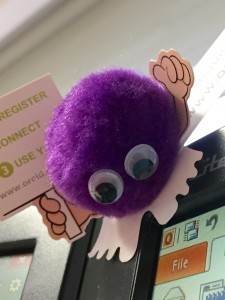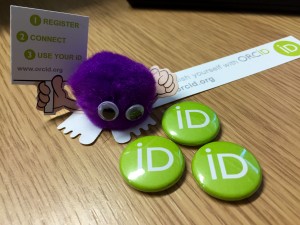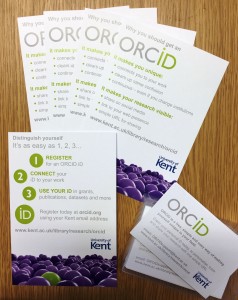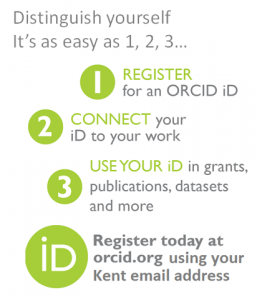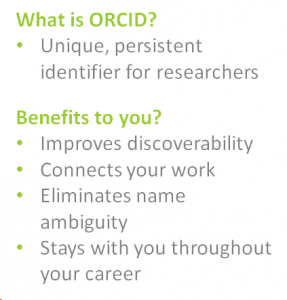When I first saw the ORCID advert in the Graduate School Weekly Bulletin and understood the idea behind it, I already got excited about its aims as well as the opportunity to be part of the team to advocate for it. Hence, I was even more excited when I met Kirsty on 28th October for a chat about the programme, my role, plans, materials we would have, et cetera.
So even before I got materials three days later on 31st, I had already started advocating for ORCID at the two PhD workshops I had attended, as well as at my school’s Staff/Student Liaison Committee meeting which was in the same week. Once I had the materials, I went about putting up posters in different schools and colleges. This was complemented by distributing leaflets, cards and other goodies.
I also had a chance to talk about ORID with my supervisors and at our school’s weekly seminars, just as I always took an opportunity to speak about it at every other Graduate School workshop I was attending at the campus. After three weeks, I was mesmerized by the amount of people who said they had either seen or heard about ORCID before and some confirmed that they had signed up and have an account.
It was also fascinating to note that at one of the seminars I attended (Measuring Research Impact), ORCID was mentioned and strongly recommended as a good tool for researchers. I was proud to an extent that I chipped in a bit to explain its benefits and that that I was part of the team here at Kent. At one of the Graduate School’s Research Cafés we have every month, I was glad to meet three PhD students who said they had heard about ORCID and signed up!
Regarding what went well, personally I would say advocating for something I believed in and was excited about was without a doubt a highlight. Other than that, getting to tell people (mostly researchers) who didn’t have an idea about it before to fully comprehend the ORCID idea and make a decision to sign up was truly the climax. The challenge was that most of them were already used to other existing tools like Academia, LinkedIn and others. However, the fact that ORCID is a unique identifier and clears out any name ambiguity seemed to make it stand out from the others.
Again, it was great to learn that people were willing to try something new and see how it is indeed different from the rest (and promised to sign up).
Other than people confusing it with other forums as mentioned above, perhaps the other challenge was when people always promised that they would sign up but you were not always sure if they really eventually signed up. The few I tried to follow up with needed to be reminded (at times on two occasions) to sign up.
Otherwise, I look forward to the last weeks of this amazing experience when I will go round the schools again to distribute the materials and talk to as much people as possibly I can. Of course I also look forward to publishing more in the future and fully utilize and live the ORCID idea and experience!
 As everyone is no doubt aware, the formal part of the ORCID pilot projects has now closed. The final meetings with Jisc were very productive, and it was great to meet some of the team from ORCID as well as catching up with the other pilot project teams. I was very pleased to hear that Laurel from ORCID especially was very impressed with our advocacy materials, and we had a very nice chat about the ideas behind them and their uses, as well as some of the things that ORCID themselves were working on in this area.
As everyone is no doubt aware, the formal part of the ORCID pilot projects has now closed. The final meetings with Jisc were very productive, and it was great to meet some of the team from ORCID as well as catching up with the other pilot project teams. I was very pleased to hear that Laurel from ORCID especially was very impressed with our advocacy materials, and we had a very nice chat about the ideas behind them and their uses, as well as some of the things that ORCID themselves were working on in this area.
